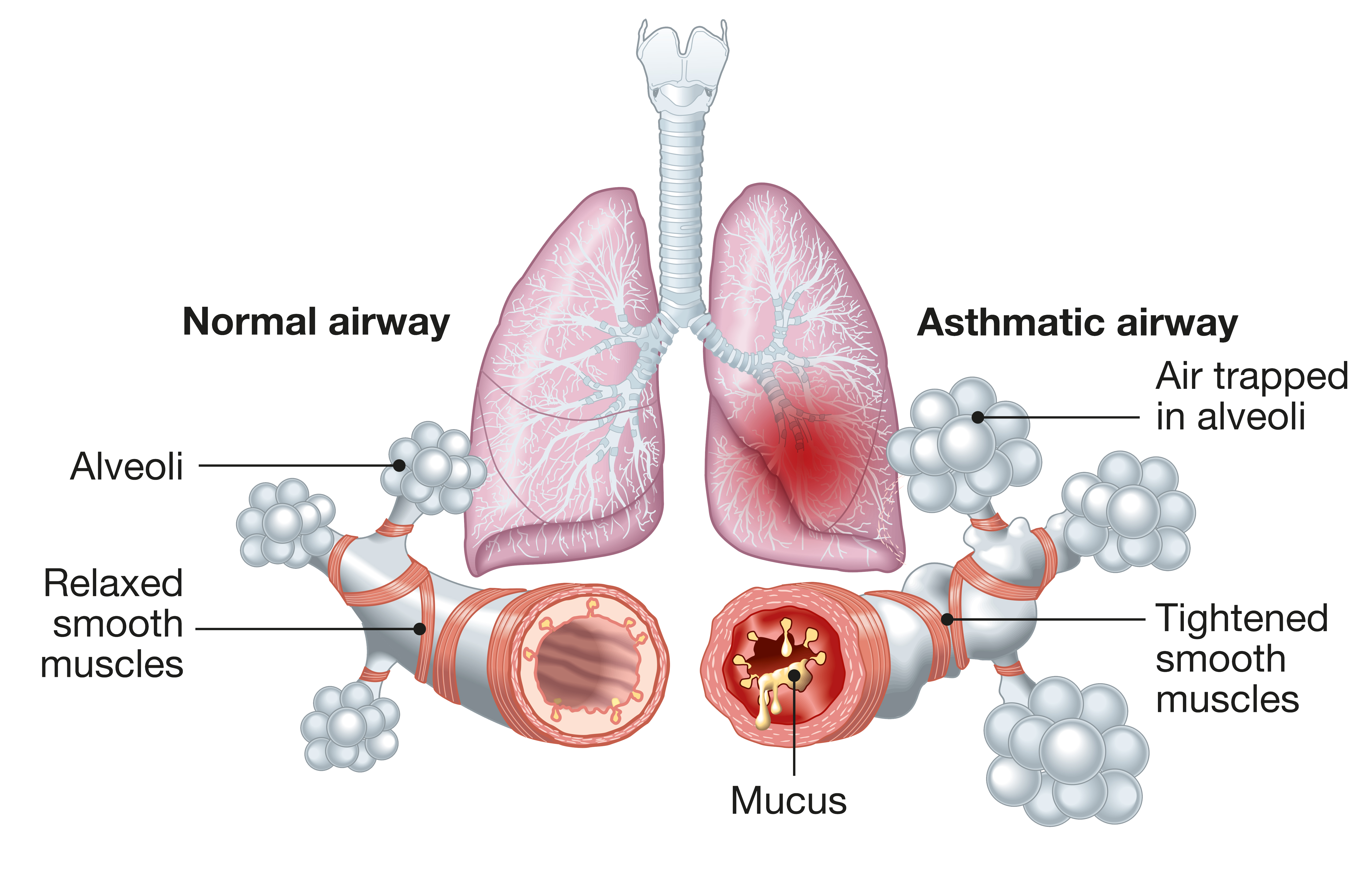Asthma in a nutshell – 10 questions and answers about asthma
Asthma | 19 August 2024
1. What is asthma?
Asthma is a chronic respiratory disease that affects people of all ages worldwide. If you have shortness of breath or tightness in your chest, or you experience wheezing or suffer from prolonged coughing, you might have asthma.
With asthma, the airways in your lungs are sensitive, inflamed and become irritated in certain situations. Irritated airways can produce more mucus and become narrow, which can affect breathing.1 Things that make the symptoms worse are commonly called asthma triggers and sometimes symptoms worsen quickly leading to an asthma attack.

2. What are the symptoms of asthma?
Not everyone with asthma develops the same combination of symptoms, but there are some common ones to watch out for.
One common symptom of asthma is wheezing, which is a whistling sound, especially when you breathe out. An asthma patient may also have a dry cough, tightness in the chest, or find it difficult to breathe in certain circumstances, for example, during exercise. Also, if you experience symptoms especially in the morning or that wake you up, the symptoms may be due to asthma.
People with asthma may exhibit any combination of these symptoms. Some may only be affected occasionally, while others may experience symptoms often. This may be classed as ‘severe asthma’.
3. What is an asthma attack?
An asthma attack is when asthma symptoms get worse, making it difficult to breathe. Individual asthma triggers may prompt asthma attacks. During an attack the muscles around the airways will tighten, the airway lining will swell, and the body may produce more mucus.
You can spot an asthma attack by looking out for signs such as bad wheezing when breathing in and out, coughing that won’t stop, and tight chest and neck muscles. Asthmatics should use their reliever inhaler as a first step to get the asthma attack under control. In a severe attack, the person experiencing the attack may also find it hard to speak, feel panicky, or might experience sweating. It might be that a reliever inhaler won’t help and it’s important to seek medical assistance. Asthma attacks can be quite serious if left untreated.
Asthma can also get worse gradually, e.g. the symptoms become more difficult over several consecutive days. It is important to keep asthma under control with regular controller medication, but in the case the asthma gets worse, extra medication may be needed. It is important to talk to the doctor or nurse to review the symptoms beforehand and adjust the medication as needed to avoid worsening periods.
4. What are asthma triggers?
An asthma trigger is anything that can worsen your asthma symptoms and even cause an asthma attack. It’s very important to become familiar with asthma triggers as they vary between people living with asthma. After identifying your triggers you can try to manage them as much as possible.
Common asthma triggers include viral infections (colds), allergen exposure, irritants such as cigarette smoke or dusts, stress, outdoor air pollution and exercise. Certain weather conditions like thunderstorms or very cold air may also trigger asthma worsening.
5. Who develops asthma?
An estimated nearly 300 million people live with asthma worldwide,2 of all ages and backgrounds – it can affect anyone. It is the most common chronic disease among children and is more prevalent in women than in men. Contributing factors for developing asthma are likely to be genetic and environmental.3 Exposure to air pollution and tobacco smoke, as well as work related exposure to agents may increase the risk of developing asthma. In addition, allergy, stress, and obesity can all increase the risk for asthma together with a genetic risk.4
People often think of asthma as just a childhood condition. However, asthma can begin at any age from early childhood to late adulthood. Asthma that starts in childhood may get better as the child gets older. When asthma begins in adulthood, it is most commonly a chronic disease needing regular medication.
6. How is asthma diagnosed?
Your first port of call is likely to be your doctor, who will examine your lungs and ask about your family medical history, your symptoms and lifestyle. Your doctor will have you perform a spirometry test and possibly further lung function tests to check your breathing. The patient might be asked to use a peak flow (PEF) meter, a handheld device you blow into to see how hard and fast you can breathe out, and to assess if PEF results will vary from morning to evening and before and after taking medication.
7. What is the treatment for asthma?
There is currently no cure for asthma, but there are medicines available to help control the disease and its symptoms. When asthma is under control, it doesn’t interfere with normal daily life. Taking the controller medication as advised by the treating doctor is one of the most important components in asthma treatment. It’s important to always discuss treatment with a doctor, nurse or pharmacist, and make sure you understand the instructions.
If you experience asthma symptoms often despite using controller medication regularly, you should review the symptoms with your nurse or doctor and adjust the medication as needed. If the regular controller (inhaled corticosteroids) does not remove your symptoms away, there are also other treatment options to be used with the controller. These include, e.g. long-acting reliever medications and leukotriene antagonists. During asthma worsening, a course of oral corticosteroid may be needed. In the case of severe asthma, biological treatments can also be used as add-on therapy under supervision of specialist centre.
Asthmatics benefit from a healthy lifestyle. If you smoke or vape, it is strongly encouraged that you stop. An active lifestyle is recommended, and regular exercise can be beneficial to you. You may also benefit from weight reduction if you are obese. A healthy diet high in fruits and vegetables is recommended for its general health benefits.
8. Asthma inhalers – what is a controller or a reliever?
Asthma is primarily treated with inhaled medicines: controllers and relievers.
A controller reduces the swelling and inflammation in airways which helps to control the symptoms and reduces the risk of an asthma attack. The controller must be taken regularly, whether you are feeling wheezy or short of breath. The medication starts helping gradually and at least 1 month of treatment is needed to evaluate if the medication is helping you.
A reliever, on the other hand, provides a short- or long-acting ‘bronchodilator’ and is a type of drug which relaxes the muscles around the lungs and opens the airways.
Relievers do not treat the underlying cause of asthma (inflammation), so they are used as needed. Controllers are the base medicine to be taken regularly.
It is important that you know how to use your inhaler properly. When you are prescribed the inhaled medicine, you should be offered training or guidance on how to use the inhaler. The instruction leaflet that come with the inhaler package also includes easy to understand instructions. If you have any doubts or questions, be sure to ask for help from healthcare professionals at your local clinic or pharmacy.
9. Is it possible to live a normal life with asthma?
It is perfectly possible to live a normal life with asthma. Although there isn’t a cure for asthma, it can be managed well with the right medication and self-care.
Most people with asthma can be as active as anyone else, but people with severe asthma may find their condition does cause them some problems.
10. What should I do if I suspect I have asthma?
As with any suspected medical condition, it’s a good idea to see your doctor as soon as you can. The quicker you can find the cause of your breathing problems, the quicker you and your doctor can find a solution.
Although it is quite a common disease, and relatively mild for most people, asthma can still be quite serious if not treated properly. If you do have asthma, seeing your doctor as soon as you suspect a problem can help prevent the condition from getting worse.
Photo by AdobeStock
References
- Global Initiative for Asthma (GINA). Global strategy for asthma management and prevention 2024 https://ginasthma.org/2024-report/
- World Health Organization | Asthma (https://www.who.int/news-room/fact-sheets/detail/asthma (Accessed Aug 2024).
- Thomsen SF. Genetics of asthma: an introduction for the clinician. Eur Clin Respir J. 2015;2:24643.
- Toskala E, Kennedy DW. Asthma risk factors. Int Forum Allergy Rhinol. 2015 Sep;5 Suppl 1:S11-6.
CORP-RESP-1833
Orion Corporation is a globally operating Finnish pharmaceutical company. We develop, manufacture and market human and veterinary pharmaceuticals and active pharmaceutical ingredients. The dry powder inhaler developed at Orion is in the core of our respiratory therapy area.



